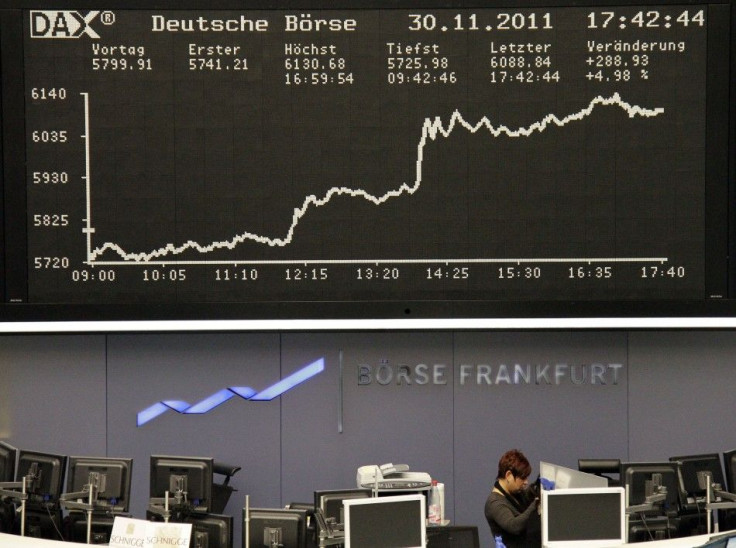Europe's Markets Mixed Thursday at Mid-day

(REUTERS) -- European shares fell in choppy trade on Thursday after data showed new U.S. claims for unemployment benefits rose unexpectedly last week, with some investors booking profits after equities jumped 9 percent in the previous four sessions.
New U.S. claims for unemployment benefits rose last week above 400,000 for the first time in just over a month, reinforcing the view that the battered labor market was healing only slowly.
Analysts said that moves such as a joint action by major central banks on Wednesday to provide cheaper dollar funding for starved banks could provide a temporary boost to stocks, but unless there was some concrete action to resolve the debt crisis, investors would tend to take money off the table.
Charts showed that a 4.3 percent jump in the euro zone's blue-chip Euro STOXX 50 index on Wednesday following strong gains in the previous three sessions had failed to break key resistance levels and the index could slip back again.
Latest surveys showing the euro zone's manufacturing sector contracted at its fastest pace in two years last month and China's factory sector shrank in November in the face of weakening demand both at home and abroad highlighted that the debt crisis could threaten a fragile global economic recovery.
At 1347 GMT, the FTSEurofirst 300 index of top European shares was down 0.2 percent at 980.20 points after falling to a low of 974.16 earlier in the session.
Construction and materials shares fell 0.8 percent on concerns a global economic slowdown will hurt the sector. Insurers were down 0.6 percent.
There was some profit taking going on given that we were hitting the top end of the recent trading range, said Lothar Mentel, chief investment officer at Octopus Investments, which manages nearly $4 billion.
Also, a lot of investors have now recognised that the central banks' action, apart from being a good signal, was just some tinkering with the symptoms and not really resolving the issues, he said, adding that he believed that policymakers were getting closer to resolve the euro zone debt crisis.
Mario Draghi, the new head of the European Central Bank, signalled it was ready to take stronger action to fight the crisis if political leaders agree next week on much tighter budget controls in the region.
There was also some relief after Spanish government's debt sale saw improved demand, although borrowing costs were at an elevated level.
TECHNICAL OUTLOOK
The Euro STOXX 50 index fell 0.5 percent to 2,319.67 points. Charts showed would struggle to retain strong gains made in the previous four sessions.
The bigger bearish outlook remains. Although the index has rebounded, we haven't broken any significant resistance level. It is well within the bounds of a corrective rally and you have still got to be very wary of the downside, said Phil Roberts, chief European technical strategist at Barclays Capital.
A move below 2,200 points, which is the base of a trading range at the beginning of November, might result in further sell-offs, he added.
Mentel of Octopus said that for risk-inclined investors, the volatile trading conditions had created more buying and selling opportunity and they should go for cyclical equities.
But we find it too early to make a call on that. We are invested in a more balanced way, with a slight tilt to the defensives, he added.
Goldman Sachs said that in the near term, the European stock market was likely to fall as recession was further priced in and earnings downgrades accelerated. It expects profits to fall by 10 percent in 2012, against a consensus of a 9.6 percent rise.
It forecasts a profit recovery of 14 percent for 2013, and given this, it expects the market to recover some time in the first half of 2012, with indexes ending the year up about 10 percent on current levels.
© Copyright Thomson Reuters 2024. All rights reserved.











